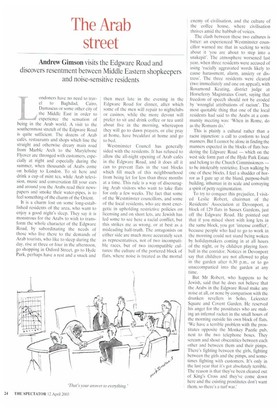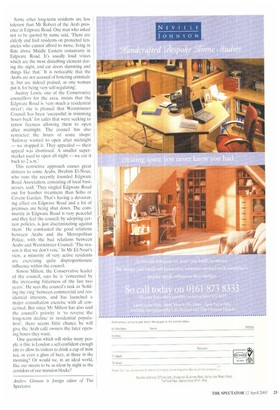The Arab street
Andrew Gimson visits the Edgware Road and discovers resentment between Middle Eastern shopkeepers and noise-sensitive residents L: ondoners have no need to travel to Baghdad, Cairo, Damascus or some other city of the Middle East in order to experience the sensation of being in the Arab world. A visit to the southernmost stretch of the Edgware Road is quite sufficient. The dozens of Arab cafés, restaurants and shops which line the straight and otherwise dreary main road from Marble Arch to the Marylebone Flyover are thronged with customers, especially at night and especially during the summer, when thousands of Arabs come on holiday to London. To sit here and drink a cup of mint tea, while Arab television, music and conversation fill your ears and around you the Arabs read their newspapers and smoke their water-pipes, is to feel something of the charm of the Orient.
It is a charm lost on some long-established residents of the area, who want to enjoy a good night's sleep. They say it is monstrous for the Arabs to wish to transform the whole character of the Edgware Road, by subordinating the needs of those who live there to the demands of Arab tourists, who like to sleep during the day, rise at three or four in the afternoon, go shopping in Oxford Street, go to Hyde Park, perhaps have a rest and a snack and then meet late in the evening in the Edgware Road for dinner, after which some of the men will repair to nightclubs or casinos, while the more devout will prefer to sit and drink coffee or tea until about five in the morning, whereupon they will go to dawn prayers, or else pray at home, have breakfast at home and go to bed.
Westminster Council has generally sided with the residents. It has refused to allow the all-night opening of Arab cafés in the Edgware Road, and it does all it can to prevent flats in the vast blocks which fill much of this neighbourhood from being let for less than three months at a time. This rule is a way of discouraging Arab visitors who want to take flats for only a few weeks. The fact that some of the Westminster councillors, and some of the local residents, who are most energetic in upholding restrictive policies on licensing and on short lets, are Jewish has led some to see here a racial conflict, but this strikes me as wrong. or at best as a misleading half-truth. The antagonists on either side are much more accurately seen as representatives, not of two incompatible races, but of two incompatible cultures: the culture of the portered block of flats, where noise is treated as the mortal enemy of civilisation, and the culture of the coffee house, where civilisation thrives amid the hubbub of voices.
The clash between these two cultures is bitter: an experienced Westminster councillor warned me that in seeking to write about it 'you are about to step into a snakepit'. The atmosphere worsened last year, when three residents were accused of using 'racially aggravated words likely to cause harassment, alarm, anxiety or distress'. The three residents were cleared (two immediately and one on appeal), with Rosamond Keating, district judge at Horseferry Magistrates Court, saying that freedom of speech should not be eroded by 'wrongful attributions of racism'. The most quotable thing that one of the local residents had said to the Arabs at a community meeting was: 'When in Rome, do as the Romans do.'
This is plainly a cultural rather than a racist injunction: a call to conform to local manners. But I cannot be alone in finding the manners expected in the blocks of flats bordering the Edgware Road — which on the west side form part of the Hyde Park Estate and belong to the Church Commissioners — to be intolerably restrictive. Even walking by one of these blocks, I feel a shudder of horror as I gaze up at the bland, purpose-built building, inhuman in its scale and conveying a spirit of petty regimentation.
To try to conquer this prejudice. I visited Leslie Robert, chairman of the Residents' Association at Devonport, a block of 129 flats in Sussex Gardens, just off the Edgware Road. He pointed out that if you mixed short with long lets in the same block, you got 'intense conflict', because people who had to go to work in the morning could not stand being woken by holidaymakers coming in at all hours of the night, or by children playing football in the corridor. Notices in Devonport say that children are not allowed to play in the garden after 6.30 p.m., or to go unaccompanied into the garden at any time.
But Mr Robert, who happens to be Jewish, said that he does not believe that the Arabs in the Edgware Road make any noise at all, or none by comparison with the drunken revellers in Soho, Leicester Square and Covent Garden. He reserved his anger for the prostitutes who are making an infernal racket in the small hours of the morning outside his own block of flats. 'We have a terrible problem with the prostitutes opposite the Monkey Puzzle pub, next to the two telephone boxes. They scream and shout obscenities between each other and between them and their pimps. There's fighting between the girls, fighting between the girls and the pimps, and sometimes fighting with customers. It's only in the last year that it's got absolutely terrible. The reason is that they've been cleared out of King's Cross and they've come down here and the existing prostitutes don't want them, so there's a turf war.' Some other long-term residents are less tolerant than Mr Robert of the Arab presence in Edgware Road. One man who asked not to be quoted by name said, 'There are elderly and frail residents on protected tenancies who cannot afford to move, living in flats above Middle Eastern restaurants in Edgware Road. It's usually loud voices which are the most disturbing element during the night. and car doors slamming and things like that' It is noticeable that the Arabs are not accused of fostering criminality, but are indeed praised, as one woman put it, for being 'very self-regulating'.
Audrey Lewis, one of the Conservative councillors for the area, insists that the Edgware Road is 'very much a residential street.; she is pleased that Westminster Council has been 'successful in trimming hours back' for cafés that were seeking to renew licences allowing them to open after midnight. The council has also restricted the hours of some shops:
'Safeway wanted to open after midnight — we stopped it. They appealed — their appeal was dismissed. A smaller supermarket used to open all night — we cut it back to 2 a.m.'
This restrictive approach causes great distress to some Arabs. Ibrahim El-Nour, who runs the recently founded Edgware Road Association, consisting of local businesses, said, They singled Edgware Road out for harsher treatment than Soho or Covent Garden, That's having a devastating effect on Edgware Road and a lot of premises are being shut down. The com munity in Edgware Road is very peaceful and they feel the council, by adopting cer tain policies, is just discriminating against them.' He contrasted the good relations between Arabs and the Metropolitan Police, with the bad relations between Arabs and Westminster Council: 'The reason is that we don't vote.' In Mr El-Nour's view, a minority of very active residents are exercising quite disproportionate influence within the council.
Simon Milton, the Conservative leader of the council, says he is 'concerned by the increasing bitterness of the last two years'. He sees the council's task as 'holding the ring' between commercial and res idential interests, and has launched a major consultation exercise with all concerned. But since Mr Milton has also said the council's priority is 'to reverse the long-term decline in residential population'. there seems little chance he will give the Arab café owners the later opening hours they want.
One question which will strike many people is this: is London a self-confident enough city to allow its visitors to drink a cup of mint tea, or even a glass of beer, at three in the morning? Or would we, in an ideal world, like our streets to be as silent by night as the corridors of our mansion blocks?
Andrew Gimson is foreign editor of The Spectator.



































































 Previous page
Previous page